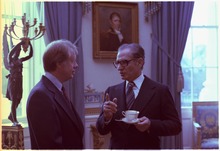
Throughout its history and up to the present day, the United States has had close ties with authoritarian governments.[1][2] During the Cold War, the U.S. backed anti-communist governments that were authoritarian, and were often unable or unwilling to promote modernization.[3] U.S. officials have been accused of collaborating with oppressive and anti-democratic governments to secure their military bases in Central America, Africa, Asia, and the Middle East. The Economist Democracy Index classifies many of the forty-five currently non-democratic U.S. military base host countries as "authoritarian governments".[4]
In cases like the 1953 Iranian, 1954 Guatemalan and the 1973 Chilean coups d'état, the United States participated in the overthrow of democratically elected governments in favor of dictators who aligned with the United States. The justification for the U.S.'s support of authoritarian right-wing governments was the resulting stability that would facilitate economic progress and the idea that democratic institutions could be encouraged and built.[4] Some critical scholars and journalists argue that this was done to reinforce Western business interests and to expand capitalism into countries of the Global South who were attempting to pursue alternative paths.[5][6][7]
- ^ Schmitz, David F. (1999). Thank God They're on Our Side: The United States and Right-wing Dictatorships, 1921–1965. University of North Carolina Press. ISBN 978-0-8078-4773-2. (review)
- ^ "Loving Dictators Is as American as Apple Pie". Council on Foreign Relations. Retrieved April 2, 2023.
- ^ Afoaku 2000, p. 13.
- ^ a b Chirico 2014, pp. 70–71.
- ^ Bevins 2020, pp. 238–243.
- ^ Blakeley 2009, pp. 21–22.
- ^ Hickel, Jason (2018). The Divide: A Brief Guide to Global Inequality and its Solutions. Windmill Books. p. 140. ISBN 978-1786090034.
If we dig behind the rhetoric, it becomes clear that Western support for right-wing coups had little to do with Cold War ideology, and certainly nothing to do with promoting democracy (quite the opposite!); the goal, rather, was to defend Western economic interests. The veil of the Cold War has obscured this blunt fact from view.